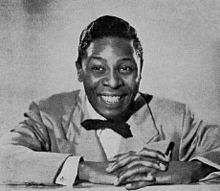Maurice Rocco
| Maurice Rocco | |
|---|---|

Maurice Rocco in 1944
|
|
| Background information | |
| Birth name | Maurice John Rockhold |
| Born |
June 26, 1915 Oxford, Ohio, United States |
| Died | March 25, 1976 (aged 60) Bangkok, Thailand |
| Genres |
|
| Years active | 1931–1974 |
| Labels |
|
| Notable instruments | |
| piano | |
Maurice Rocco, born Maurice John Rockhold (June 26, 1915 – March 24, 1976) was an African-American pianist, singer, actor, and composer known for playing boogie-woogie piano and his disdain for using a piano bench. He was a top nightclub and theater draw in the 1940s, and made several film appearances. He toured the United States, Canada, and Europe before becoming a fixture in Bangkok, Thailand, where he was murdered.
Maurice Rockhold was born in 1915 in Oxford, Ohio to a music teacher mother. His mother taught him classical piano starting at age 10, but did not interfere with his interest in rhythm playing as long as he finished his lessons. He entered Miami University as a music student (from where he was later to earn a Master of Music degree,) but soon quit to work for radio station WLW. In addition, he also taught piano harmony at Oberlin College. His work at WLW impressed Noble Sissle so much that he hired him to work with the Rogers Sisters at the Kit Kat Club in New York, and the act was renamed The Three Roccos. He was to later legally change his last name from Rockhold to Rocco. In 1938, Rocco left the club to participate in two films, Vogues of 1938 and 52nd Street. He returned to New York to form his own band, which included Alton Moore, Arville Harris, and Bobby Holmes among its members. By the early 1940s he was no longer fronting a band, but was working as a solo act.
Between 1940 and 1941 he cut 14 sides for Decca, most of which were released on their "Sepia" series. He did not join active military service because his poor eyesight classified him as 4-F, but during World War II he entertained American troops, both in person and as part of the American Forces Network Jubilee radio program. Rocco spent most of the 1940s headlining at nightclubs and theaters (where his engagements would extend into months) and participating in vaudeville revues. By 1944 he had a US $500,000 insurance policy on his hands. Alongside Mary Lou Williams, he represented the United States in the second African Dance Festival at Carnegie Hall in April 1945. He was married to Iantha on July 3 of that year. Later in 1945, he appeared in his most famous role in the film Incendiary Blond. His earnings in 1945 topped U.S. $250,000. Despite all the professional success, this marriage was short lived. Iantha filed for divorce before their first anniversary amid allegations of physical and mental abuse. He signed to RCA Victor Records in 1949.
...
Wikipedia
